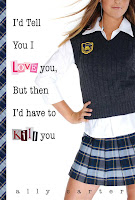STATUS: Foiled by technical difficulties on my home wireless last night. Serves me right for saving the blog until late…
What’s playing on the iPod right now? GET THE PARTY STARTED by Pink
Here’s a memo for authors who are looking for a new agent after being previously represented (or are currently represented).
You need to know your options—literally.
What do I mean? You need to know where your current/former agent stands on your option material for your current contracts. Per your agency agreement, do they have the right to shop your next project regardless of whether you have formally severed the relationship?
I think it’s important to have the answer to this question before you start looking for a new agent. It is going to be one of the questions you’re going to be asked and you might as well have all your ducks in a row.
Although why one would need to put ducks in a row is a mystery to me but it’s a great phrase and I assume it has something to do with the Mama duck leading her chicks but I digress.
Once you’ve got that understanding, pull your current contract(s) and make a copy of your option clause(s) for any new possible representative as well as creating an outline of where you are in the process. As in, still in option, must submit proposal soon. Out of option, feel free to shop anew. Previously shopped, here is who saw it. Here is what else I have.
The whole shebang as an agent will want that info as well. You’ll come across as prepared and professional which can only make you a better prospective client to anyone who is considering taking you on.
It will allow you to answer questions in a knowledgeable way and make you ready for a good and productive conversation when that time comes.
TGIF! Have a great weekend.

